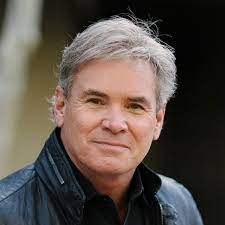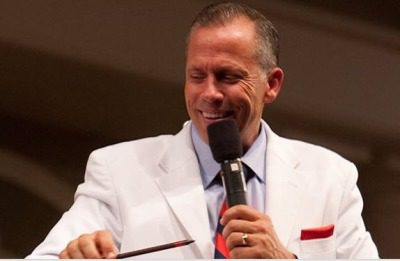I previously mentioned that Independent Fundamentalist Baptist (IFB) luminaries Bob Gray, Sr., retired pastor of Longview Baptist Temple, Longview Texas, and Steven Anderson, pastor of Faithful Word Baptist Church, Tempe, Arizona are currently in a pissing war over whether homosexuals are “born that way.” Accusatory winds have blown the conflict into far corners of the IFB universe. The burning question facing these defenders of the one true and holy Baptist faith is this: Are homosexuals genetically born homosexual (nature or nurture)?
That IFB preachers are even considering this question is astounding, a sign that LGBTQ people are making themselves known in IFB churches and families. (Please read The Jonathan Nichols Story: Growing Up Gay in the IFB Church.) While there have always been gays in IFB churches, these tortured souls were buried so deeply in the dark recesses of church closets that there was little chance they would be discovered.
In the years since I left the ministry and Christianity, I have reconnected with several men who were children in one of the churches I pastored. These men are proud, out-of-the-closet, sexually active gays. My mind goes back to the days when these men were young boys and teens who were forced to listen to preaching — not only mine, but that of evangelists and other guest speakers — who regularly excoriated homosexuals for vile, deviant, reprobate sexual behavior. While I have apologized to these men for my hateful, bigoted preaching, I can’t help but wonder how much damage my words did to them.
Over the years, a handful of LGBTQ people wandered into many of the various churches I pastored. While they didn’t announce their sexuality as they came through church doors, over time it became clear that they were physically attracted to the same sex. Sadly, once the whispers of gossip turned into accusations, I was put into the unenviable position of deciding how to deal with them. At the time, I believed that LGBTQ sexual behavior was sinful, and, in some instances, a sign that people were reprobates. (Please see Out of the Closet, Into the Light: According to Steven Anderson, I Am a Sodomite.) I regularly preached against sexual sins, giving adultery and fornication as much attention as homosexuality. The difference was how I went about preaching against homosexuality. Shamefully, I must admit that I used derogatory labels when preaching against homosexuality — words such as queer, homo, sodomite, and fag. I refused to use the word gay because I believed that there was nothing “gay” about the homosexual lifestyle. I remember — oh, I wish I could forget! — when the AIDS epidemic came to light that I let congregants know that AIDS was God’s judgment of homosexuals. Had I remained an IFB preacher, I have no doubt that I would have been staunchly opposed to same-sex marriage.
LBGTQ people didn’t stay around long in the churches I pastored (with the exception of the men mentioned above, who were forced by their parents to listen to my preaching for years). When whispers turned to accusations, I confronted these “perverts,” demanding they leave the church. In one church, a gay man visited for months before it was discovered that he was a pedophile. Several fathers came to me and said this man was inviting their young sons to spend weekends with him at his nearby farm. Livid, I went to this man and told him he was not allowed to attend the church. When he objected, I threatened to physically throw him out of the church. He left, never to return. In retrospect, I deeply regret how I handled the matter. If the man was indeed a pedophile, I should have reported him to law enforcement. If he wasn’t, I should have tried to help him, though I doubt that there was much I could do because of my homophobic beliefs. That he was accused of being a pedophile was enough to reinforce the stereotype believed by many congregants: homosexuals are child molesters.
Thirty years later, some LGBTQ people in IFB churches are no longer willing to sit by and silently suffer while their preachers rail against homosexuality and same-sex marriage. I have always wondered why anyone would willingly submit themselves to psychological assaults by supposed “men of God.” Children and teenagers have no choice, but adults are free to flee the verbal assaults and attacks on their person. Why stay?
As American society becomes more LGBTQ-friendly, IFB churches are confronted with how best to minister to people whom they consider to be sexual deviants. The Steven Andersons of the IFB world think attacking LGBTQ people in their sermons is the best way to “reach” them. I highly doubt such preaching is reaching anyone for Jesus. In fact, I doubt that reaching “sodomites” for Jesus is the goal of men such as Steven Anderson and Bob Gray Sr. As anyone raised in the IFB church movement can attest, attacking homosexuals from the pulpit is a surefire way to get lots of rounds of “amen!” Preaching against certain sins will always invigorate the righteous, and sexual sins are crowd favorites (even though we now know that IFB congregants are not immune from all of the behaviors they deem sexual misconduct, including homosexuality, pedophilia, incest, adultery, and fornication).
Realizing that the cultural tide is turning against IFB churches and their incessant prattle against sexual sin — particularly homosexuality — men such as Johnny Nixon and Bob Gray, Sr. have cooked up a novel reinterpretation of what the Bible says about homosexuality. Now, these men still believe engaging in homosexual sex, or any sex outside of marriage, for that matter, is a sin, but they now admit that homosexuals are “born that way.” These “eunuchs” are expected to refrain from same-sex sexual behaviors and relationships, and if they are willing to do so, they will be considered Christians. I suspect that the greater goal is to “convert” homosexuals, helping them to see that only by switching sides can they ever know true sexual fulfillment and romantic love. I am left to wonder why, if it is God who determines sexuality, does he make some people homosexual while at the same time saying that homosexual sex is a criminal act worthy of execution. (I refrain from using the LGBTQ acronym because the IFB preachers in question do not consider all sexual identities equally. Their primary focus is on gay men. I know of no IFB church that is accepting of bisexuality or transgenderism.)
My good friend, the late Steve Gupton— an IFB preacher turned atheist who once attended Bob Gray’s church and college and later attended a church named Hyles Baptist Church — made me aware that Jack Hyles worshiper David J. Stewart has weighed in on the Gray Sr./Anderson fight. In a post titled Refuting the Book ‘Born that Way After All’ and the Compromised Preachers Who Support it, Stewart stated:
I was surprised today while listening to a sermon by Pastor Steven Anderson (website). There is an ungodly book (published in 2015) titled, “BORN THAT WAY AFTER ALL,” authored by Dr. David J. Nixon and R. G. Hamm. They also have a website at BornThatWay.org. The book is unscriptural and promotes a wicked philosophy of tolerance for sin. What surprised me is that the website lists Dr. Bob Gray Sr., Pastor Jeff Owens and Pastor Paul Chappell, as being supporters of the book and ministry. The book is an ungodly perversion of the Scriptures!!!
I am trying to understand why Dr. Gray and Pastor Owens would approve of something evil like this. Both of these good men have counseled tens of thousands of people combined throughout their church ministries. So I tread lightly and don’t want to criticize them in my article, this is not my intent. However, I will voice my opinion of this ungodly book “BORN THAT WAY AFTER ALL” and their ungodly “BORNTHATWAY.ORG” website. The book is clearly a sinful attempt to bridge the gap between the ungodly homosexual community and the New Testament Church. Dr. David Nixon and his co-author are trying to straddle-the-fence on the issue of homosexuality. As far as I’m concerned, they are pulling on the same rope as the Devil.
David J. Nixon and R. G. Hamm base their strange doctrine on Matthew 19:12, “For there are some eunuchs, which were so born from their mother’s womb: and there are some eunuchs, which were made eunuchs of men: and there be eunuchs, which have made themselves eunuchs for the kingdom of heaven’s sake. He that is able to receive it, let him receive it.” Being a eunuch from a mother’s womb simply means, for one reason or another, that a man is born impotent. The Greek word for “eunuch” in Matthew 19:12 is eunouchos, meaning, “a castrated person (such being employed in Oriental bed chambers); by extension an impotent or unmarried man; by implication a chamberlain (state officer).” Here’s some helpful Bible commentary on the topic, “EUNUCH.”
The Bible mentions eunuchs, who are born “THAT WAY” from the womb, which is equivalent to castration. This is not homosexual lust! A eunuch “FROM THE WOMB” cannot procreate, that is, cannot have children. A homosexual can procreate (with a woman if they so choose). Obviously, homosexuals do not come “FROM THE WOMB”! And as I will evidence to you later, many people who profess to be “heterosexual” admit to committing homosexual acts at times. This tosses a monkey-wrench into David Nixon’s retarded hypothesis! Homosexuality is a sin, and Christians won’t be able to help sodomites unless they address the issue as such. God only saves THE UNGODLY (Romans 4:5-6). It is evil to tell homosexuals that there’s really no problem, because God made them “THAT WAY AFTER ALL,” intending for them to become celibate as eunuchs for God. That doesn’t solve the problem, which is, HOMOSEXUALS ARE SINNERS in need of the new birth. Unless a homosexual is willing to confess to God, “I AM A SINNER,” they cannot be saved. You’ve got to admit that you are a sinner to believe the Gospel. You need to know what you’re being saved from!
On their “BORN THAT WAY AFTER ALL” website, they say:
“The gay community is not the battle field, they are the mission field. They are not the enemy, they are the mission itself. We are in a spiritual battle, but if you view them as the enemy, you are fighting the wrong war (Ephesians 6:12). Our book “Born That Way After All” explains God’s unique design and purpose for those who are not attracted to the opposite sex.”
Although I agree that the gay community is a mission field, from a soul-winning perspective; I totally disagree when such reasoning is used to silence Christians about the evils of homosexuality which is targeting, recruiting and hurting America’s children. Hugh Hefner’s perverted Playboy business could be called “a mission field” too. We could say that the dirty magazine business is not the enemy as well. But does that mean preachers and Christians should be silent about such evils? Of course not. Now, more than ever, pastors and Christians need to expose the evils of homosexuality in our society. Silence is not golden, it is yellow cowardice. The false idea that exposing homosexuality as a filthy sin will hinder reaching the gay community for Christ is a big lie!
Homosexuality Is A Filthy Deathstyle (homosexuals account for 75% of all Syphilis cases!). Placing an adopted child into the hands of two homosexual parents (perverts) ought to be considered criminal child abuse! But our nation’s ungodly courts disregard God’s Word. Americans can legally commit adultery, film themselves in bed having sex and upload it to the internet, get drunk, murder their children by abortion, homosexuals can marry and children are forced into their care by adoption, et cetera. In eternity, God will hold people accountable for even their words (Matthew 12:36).
The insane notion that believers will never convert homosexuals to Christianity by calling them “perverts” is totally untrue. When the rich man in Hell begged Abraham to send Lazarus from the dead to warn his five brothers, “lest they also come into this place of torment” (Luke 16:28). Abraham plainly said that if people won’t listen to the Word of God, THEY WON’T GET SAVED, even if they see miracles and supernatural signs. “Abraham saith unto him, They have Moses and the prophets; let them hear them. And he said, Nay, father Abraham: but if one went unto them from the dead, they will repent. And he said unto him, If they hear not Moses and the prophets, neither will they be persuaded, though one rose from the dead” (Luke 16:29-32).
The ungodly book effectively attempts to silence Christians to the evils of homosexuality, portraying sodomites as a needy group who ought to be ministered to (informed that God really made them to be eunuchs) and otherwise left alone. So while naive preachers are spending the rest of their life reaching out to gays with the Gospel, America’s children are being homosexualized. If churches must become worldly to attract the homosexual community, then they’re coming to apostate religion, not Jesus Christ.
Although I disagree with Pastor Steve Anderson’s lack of love for the homosexual community, I must say that Brother Anderson COMES MUCH CLOSER TO BEING RIGHT than today’s compromised preachers who hobnob with gays and won’t preach against them!!! HOMOSEXUALITY IS EVIL. You’re NEVER going to win sodomites to Christ by tolerating their sins. A fundamentalist preacher ought to be a balance of grace and truth, of strength and beauty! Jude 1:22, “And of some have compassion, making a difference.” John 7:7, “The world cannot hate you; but me it hateth, because I testify of it, that the works thereof are evil.” The Word of God condemns the sinful world. That’s why gays reject the King James Bible, changing it into a lie (Romans 1:25). All of the modern PERversions of the Bible completely remove the word “sodomite.” The unscriptural website “BORN THAT WAY AFTER ALL” says they “do not necessarily endorse the term… ‘homosexual’ for several Biblical reasons.” [1] These are wicked people, who are trying to silence fundamentalist Christians about the evils of homosexuality. The idea that preaching and standing against open public wickedness, is a form of hate, is as satanic as can be!!!
….
I love Pastor Jeff Owens and Dr. Bob Gray Sr. I promote their sermons and ministries, because my heart’s desire is to help others in the Lord. I don’t throw people away because I disagree with them on something. I don’t stop promoting someone because they don’t agree with me. My faithful web visitors know that I often promote and expose someone at the same time. Most preachers won’t do that. Dr. Hyles invited Dr. R. G. Lee to preach at Pastor’s School in Hammond, knowing that Dr. lee was in the compromised Southern Baptist Convention. Dr. Hyles didn’t demand that someone agree with him 100% on everything, to be his friend. I like that! There’s not one man that I promote whom I agree with on everything. I want to help others. If I find something that helps me, I want to share it with you also, to help you too. YOU are my Epistle. YOU are the book that I am writing. 2nd Corinthians 3:2, “Ye are our epistle written in our hearts, known and read of all men.” YOU are my treasure!
Having said that, I love the preaching and teaching of Dr. Bob Gray Sr. and Dr. Jeff Owens. Albeit, I do not agree with them in their support of the “BORN THAT WAY AFTER ALL” book and “BORNTHATWAY.ORG” website, where they are listed. I am 100% in agreement with Pastor Steven Anderson on this issue, because I believe Brother Anderson’s position is 100% Biblical. Romans 1:24-32 plainly condemns the homosexual deathstyle!!! No one is born with a Sodomite tendency. Homosexuality is abnormal, against nature. We are all born with a sin-nature. If the sin-nature is allowed to flourish, uncontrolled and unbridled by moral restraint, anything evil is possible. America was doomed the day in 1963 that the King James Bible was removed from our nation’s classrooms.
All human beings are born with a sin-nature. Romans 5:12, “Wherefore, as by one man sin entered into the world, and death by sin; and so death passed upon all men, for that all have sinned.” We are ALL sinners by nature and by choice. A child doesn’t have to be taught to steal. They have to be taught to be honest. Children must be trained and taught the Word of God. And yet, even having grown up in the best home, with the most faithful Christian parents, enrolled in a great Christian school, attending a strong Bible-believing church—They may still ruin their lives and choose to go into a reckless deathstyle of sin. Having good Christian parents does not guarantee godly children. Certainly, training up a child in the admonition and nurture of the Lord stacks everything in their favor when they become adults, but they are still sinners by nature and by choice. What a proper upbringing DOES give a child is a strong FOUNDATION for the rest of their life. So if the house of their life burns down one day, it can be rebuilt!!! Amen!
No one is “BORN THAT WAY AFTER ALL.” I am not trying to be mean or unkind to anyone. If you are not saved, you’ll never get the victory over sin. Galatians 2:20, “I am crucified with Christ: nevertheless I live; yet not I, but Christ liveth in me: and the life which I now live in the flesh I live by the faith of the Son of God, who loved me, and gave himself for me.” If you have homosexual desires as a believer, then there is a Bible verse for you. 2nd Corinthians 10:5, “Casting down imaginations, and every high thing that exalteth itself against the knowledge of God, and bringing into captivity every thought to the obedience of Christ.”
You can read all of Stewart’s homophobic rant here.
Stewart’s website features countless articles against this or that sexual sin, leaving me to say “The [man] doth protest too much, methinks.” I so wish that there were a God and I wish there really were a Jack Chick-like This Was Your Life final judgment. Can you imagine what would come rolling out IFB closets come judgment day? (It is rumored that Stewart has a few skeletons in his closet.) All of us have things that we have done that we never want to be brought to light. All of us have done things that we regret or wish we had done differently. The good news is that our embarrassments are safely stored in the back of our closets right next to our white buckskin shoes, platform shoes, frayed blue jeans, maxi dresses, and our dad’s collection of old Playboy magazines.
With one exception, I oppose prying open the closets of others, revealing secrets long buried in the dark recesses of people’s lives. We all have a right to have secrets, things that are no one’s business but ours. I do my best to write openly and honestly about my past and present life. But, there are some things that I can’t or won’t talk about because I find these events embarrassing — even fifty-plus years after the fact.
The one exception I make is for preachers, politicians, and church leaders who deign to be the voices of moral authority; those who demand the Ten Commandments be posted on school walls and self-righteously demand their fellow citizens obey the anti-human moral code found in the Bible (as interpreted by them according to a literalistic, Fundamentalist hermeneutic). These defenders of virginity, the anus, and all things sexual, often don’t practice what they preach. While these “men of God” are preaching against adultery, fornication, pornography, homosexuality, masturbation, short skirts, tight pants, teenage petting, and lustful glances, they are often wallowing in the very sins they condemn. (Behaviors they call sins, anyway. I wouldn’t call these behaviors sins, depending, of course, on context. Sins? No. Bad Behaviors? Maybe.) For these self-absorbed preachers of God’s plan of intercourse — Evangelical, heterosexual, married, missionary position only — I am all for exposing their secrets. It is for this reason I write the Black Collar Crime series. The sooner the truth is known — that preachers are no different from the unwashed, uncircumcised Philistines of the world — the better. Imagine how different things would be if Evangelical preachers swung wide the doors of their closets and openly talked about what is buried deep within. I am not talking about criminal behavior here. Sexual predators who hide in plain sight as pastors, evangelists, missionaries, and church leaders should be aggressively pursued and prosecuted. The secrets I am talking about are the things that are common to man. Imagine how different Sunday morning church would be if preachers admitted that they are human, burdened with the same desires, wants, needs, emotions, and feelings as everyone else. Granted, Evangelicals would have to re-write the Bible and abandon previously held certainties for them to truly reenter the human race. As long as they maintain that the Bible and Christianity are morally superior and demand everyone live according to their interpretation of a bronze-age religious text, preachers shouldn’t be surprised when people take delight in their moral failures.
Bruce Gerencser, 68, lives in rural Northwest Ohio with his wife of 47 years. He and his wife have six grown children and sixteen grandchildren. Bruce pastored Evangelical churches for twenty-five years in Ohio, Texas, and Michigan. Bruce left the ministry in 2005, and in 2008 he left Christianity. Bruce is now a humanist and an atheist.
Your comments are welcome and appreciated. All first-time comments are moderated. Please read the commenting rules before commenting.
You can email Bruce via the Contact Form.
Share This Post On Social Media:










